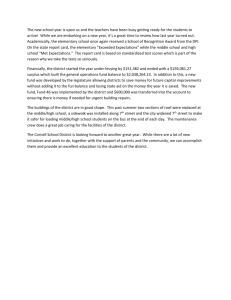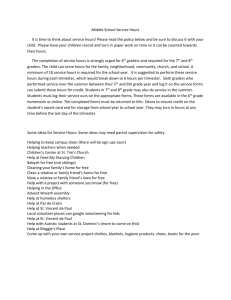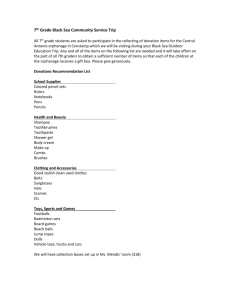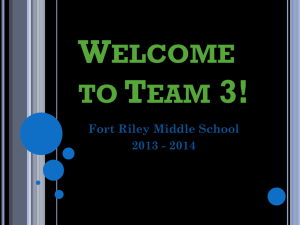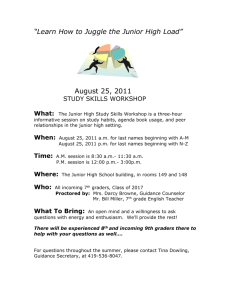Life as a 7th Grader
advertisement
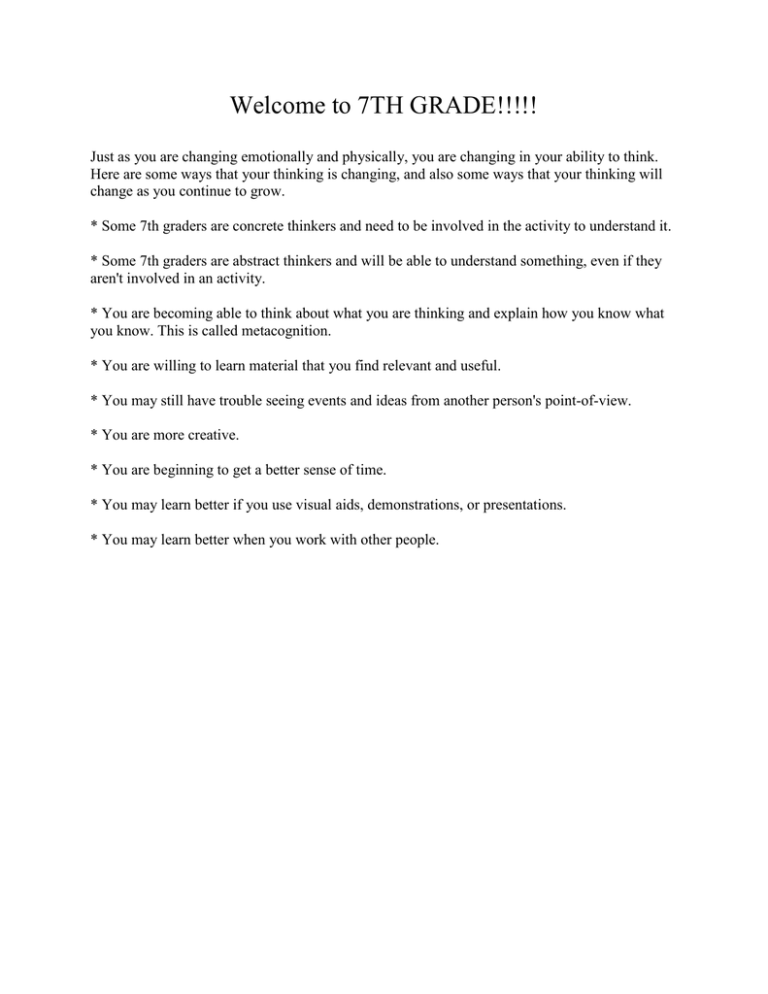
Welcome to 7TH GRADE!!!!! Just as you are changing emotionally and physically, you are changing in your ability to think. Here are some ways that your thinking is changing, and also some ways that your thinking will change as you continue to grow. * Some 7th graders are concrete thinkers and need to be involved in the activity to understand it. * Some 7th graders are abstract thinkers and will be able to understand something, even if they aren't involved in an activity. * You are becoming able to think about what you are thinking and explain how you know what you know. This is called metacognition. * You are willing to learn material that you find relevant and useful. * You may still have trouble seeing events and ideas from another person's point-of-view. * You are more creative. * You are beginning to get a better sense of time. * You may learn better if you use visual aids, demonstrations, or presentations. * You may learn better when you work with other people. What can I expect from myself? 7th Grade is not only a transition from elementary to middle school; it is a transition in behavior also. These behavior changes are normal and nearly everyone goes through them at one point or another. Knowing what changes to expect can make you feel "normal" and not worry about being different. It can also let parents know what to expect, so that they can react to you in a more positive way. 7th Grade Characteristics Emotionally * Emotionally intense highs and lows * Think about yourself constantly * Want privacy * Want to be like everyone else * Worry a lot - every little thing seems like the end of the world * Wanting to be a kid some moments, and wanting to be treated like an adult the next Feelings about Yourself * Trying to figure out who you are and what you want * Critical of your own appearance * Difficulty in accepting praise Parents * Less participation with family activities * More critical of parents * Strong need for parental support * Wanting to know your boundaries * Want to feel appreciated and valued Physically * Restlessness * Worry about appearance and fitting in * Worry about physical changes * Horseplay, active * Attempt dangerous stunts thinking you are invincible * Tired * Hard to sleep at night, but hard to stay awake during the day Dealing with Others * Sense of humor and fair play * You have a lot of personal interests - sports, band, art, etc. * You want to fit in, but yet be unique * You want a best friend or close friend * You either hate or love school * You are learning to work in groups * You are forming relationships with adults besides your parents - teachers, coaches, aunt, etc. What do you mean QUALITY? In 7th grade, we spend a lot of time talking about quality work. If you were offered frosted and sprinkled cookies, plain cookies, or broken cookie crumbs in a bag – which would you choose? You would likely choose the sprinkled cookies. When asked why, the response would often be: "They look better." It is the same way with your work. It may be the same assignment, but the person who took the extra time to do the sprinkles, can't help but give a better overall impression. It won't make the difference between an "F" and an "A", but it can help. Here are some tips to help make your assignment "Sprinkle Worthy" Quality Work 1. Quality work is neat! A. It is free of smudges, scribbles, or stains. B. It has no wrinkles or spiral edges. 2. Quality work is legible! A. It uses a whole sheet of light paper. B. It uses blue or black ink. C. Typing is always great. 3. Quality work is 100% complete. 4. Quality work means best effort! 5. Quality work is... A. Colorful B. Detailed C. Careful Study Time Studying is not a favorite way to spend your time, but if you learn to study, it can be quicker and easier. Here are some tips are making studying easier. Planning 1. Listen to the teacher giving the assignment. Write down what the assignment is, when it is due, and any other requirements given to you. If there is a handout, keep it in a place where you can find it easily. Don't push it in to the bottom of your backpack. 2. Use a planner to help you keep track of assignments and due dates. 3. Ask questions if you don't understand. 4. Organize yourself. It helps if you have a folder or binder that keeps your work from each class together. That way you have everything you need at once, and you don't lose it before you turn it in. 5. Look at the due dates and work backwards. If you have a research report due in three weeks, maybe you will set the goal of doing the research the first week, the outline the second week, and the paper the third week. This keeps the assignments from being overwhelming. Environment 1. Study in the same place every day. 2. Make your study place a nice, relaxing place, but not where you will be distracted. Studying in front of the TV is not a good place to study. 3. Make sure you have all of the items you need, so you don't waste time finding materials. 4. Decide what you are going to work on and do it for about 30 minutes. Then take a 10 - 15 min. break and do something active. Then go back for another 30 minutes of study time. 5. Even if you don't have homework, reread your notes, reread old quizzes, etc. This will help you stay caught up for tests and make them easier to study for later. Helpful Study Ideas 1. Study with a partner and quiz each other. 2. Use visual aids, graphs, pictures, flash cards, etc. to help you remember. 3. Use memory tricks - like mneumonics. 4. Visualize the ideas in your head. 5. Read the information out loud or set it to music. Hearing it will help you remember better. Book Ideas! Harry Potter - any of the series is a great choice for a reluctant reader. I haven't had one student read the series and not love it. Most of the students who have read them and told other students about them, have watched their friends get hooked, too. Most of them come to the end of the third book and say, "Now I have to wait until summer for the next one. Now what will I do?" It's also great fun for adults. The Cat Ate My Gymsuit is another great choice. Marcy is thirteen and is going through many of the same things 7th graders go through. She worries about her weight, having friends, her grades, hating school, and fighting with her parents. Through the novel, Marcy learns to have more confidence in herself, and not to give in to peer pressure. A great book for 7th graders. Freak the Mighty is another great choice for 7th graders, especially boys. This is the story of two boys who are ready to start eighth grade after the summer is over. Max is big and dumb and is used to being in special classes where people make fun of him. Kevin is small and has a handicap. His inside body is growing faster than his outside. He is also a genius. Together the two boys discover the strength of friendship and are able to overcome many obstacles. They become stronger by uniting together. A great book about friendship, courage through adversity, and loss. Other Great Books Gregor the Overlander The Beyonders Wonder Fablehaven What?!?!?! I have to LEARN!?!?!? One of the hardest parts of middle school is finding out that you are expected to read to learn. A teacher may tell you to read a chapter tonight, and expect that you will understand it tomorrow. This is usually hard for 7th graders to do at first. Your English teacher has probably told you that when you write, you need to follow a certain format, or stencil, depending on the type of writing you are doing. Luckily, this advice works for the author of a textbook, also. The author will have a certain format that lets you know what she or he is talking about. There are five types of expository text. 1. Description is a description of something. A science book might describe types of animals, a history book may describe a battle, or a TLC class might describe a job. 2. Sequence tells you things in a step-by-step order. You see this in a recipe, a how-to book, or a history book telling you the steps that led up to a war. 3. Compare/Contrast tells you how two things are alike and how they are different. A history book might compare people or places, an English book compare different books or writing styles, or a math book might compare two different problems. 4. Problem/Solution starts with a problem and then gives you some possible solutions. You might see this in a math book, a science book talking about an environmental problem, or a history book showing a problem people encountered and how they solved it. 5. Cause/Effect is when you are given a cause of something and then telling you what the effects are. For example, a science book might discuss the causes of global warming and then discuss the effects of global warming. Your history book might discuss causes of the civil war, and then discuss the effects of the war. By understanding the types of expository writing, you will be able to find the type the author used and give yourself a framework as you read. The framework helps your mind understand better, because it knows what to look for. It isn't trying to understand everything at once. For example, if I know it is a problem/ solution text type, my brain can just look for the problem and the solution, while ignoring all of the other details. This also helps you learn for the tests. If your teacher asks you for the causes of the civil war, and you noticed that type of text structure in the reading, you will be able to remember the causes better. You won't waste all of your time trying to remember the whole chapter. Can reading a book actually be fun? You may remember enjoying reading in elementary school. You may remember how fun it was to be read to, or reading to someone else. Reading for fun is harder to do as a teenager. You have lots more homework, more responsibilities, sports, friends, and less time to spend enjoying yourself. However, reading for fun is just as important as reading to learn. Reading is a skill that takes practice to get better at it. The better reader you become the easier and more fun it is. It also makes reading to learn easier to do. Fiction lets you enjoy yourself by allowing you to escape into another world. It's better than a movie or TV show because you can imagine the characters, the events, the colors…. You don't have to see what someone else wants you to see. It gives you a chance to experience other people's lives, ideas, choices, decisions, or problems without having to actually deal with it yourself. It also helps you relate to other people and not feel so alone. Tips to Make Reading More Fun 1. Listen to books on tape 2. Read out loud to someone or have them read to you 3. Make a book club with your friends or start one at school. Read a book and then have a book party to share your thoughts on the book. (It's a good way to get your parents to let you have a party, when you tell them it's about books.) 4. It's okay to put books back that you start and don't like. 5. It's okay to reread books you like. 6. It's always "cool" to be reading a magazine. 7. Set a reading goal and reward yourself with something special when you reach it. EWW – NOT TESTS!!! Most 7th graders don't look forward to tests. However, it tends to be a large part of many 7th grade classes. There is no way to get an A if you don't know the material, but there are some tips that will help you study better and get a better start on the test. Tips for Preparing for a Test 1. Have a good attitude. It will keep your brain from shutting down. 2. Read over your notes, the book, or assignments to review for the test. 3. Make and use flash cards. Visual aids help! 4. Keep up with your homework. 5. Review any old quizzes for possible test questions. 6. Find a study buddy and quiz each other. 7. Get a good night's sleep. 8. Eat a good breakfast or lunch. You can't concentrate if you are hungry. Tips for During the Test 1. Have a good attitude. 2. Write your name on your test as soon as you get it. 3. Skim over the whole test to get a feel for it, what you will need to do, and how much time it might take you. 4. Read the directions carefully. 5. Answer easy questions first and skip the questions you don't know. You can always go back later. 6. Write neatly. 7. Check your answers if you have time, but remember, your first answer is usually your best.
